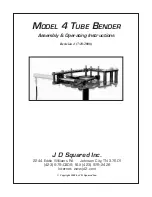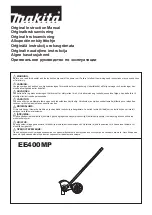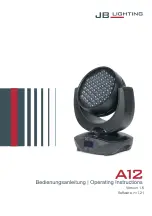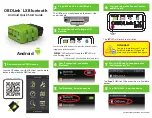
Page 13 “Master Slave Dip Switch Settings”).
7. Please follow the chart on page 13 for all slave dipswitch settings.
Note only one fixture may use the master units dip switch settings
(see Page 13).
8. After all the units settings have been set and are plugged in, adjust
the sensitivity knob on the bottom of the master unit to make them
react to sound.
9. You can also use the optional MINI/C Remote Control. If you want
to use the optional remote control, connect the MINI/C controller
to the first fixture in the line (master).
Note: The remote control
only operates in Stand-Alone and Master/Slave modes. If the
remote is connected in DMX mode it will not function.
DMX Mode:
This fixture will react with DMX operation. For best
results use only one motor function for each scene (or step), when
programming scenes into a DMX controller. This will give you faster
mirror and faster gobo/color changes. For Example:
A. With DMX controller move the mirror up then program the step.
B. Move the mirror down then program that step.
C. Change the gobo/color wheel then program that step.
D. Continue this pattern to achieve best results.
1. Operating through a DMX controller allows users to create custom
programs tailored to their individual needs. This function also
allows you to use your fixtures as spots.
2. This operation will allow you to control each individual fixtures
traits with a standard DMX 512 controller such as the American DJ
Show Designer™ or the American DJ
®
DMX Operator.™
3. The DJ Roller™ uses four DMX channels to operate; Channel 1
is Rotation, channel 2 is Tilt, channel 3 is Color change, and
channel 4 Gobo change.
4. To run your fixture in DMX mode, plug in the fixture via the XLR
connections to any standard DMX controller. - Follow the set-up
specifications that come with the controller.
5. Set the proper fixture DMX address. The DMX address is adjusted
with the dipswitches on the bottom panel of the unit. Page 13
Details a DMX chart. Please note that the chart on page 13 is set-
up as a guide only. For proper DMX addressing please refer to the
DMX binary rules on page 6.
DJ Roller™
Operating Instructions
DJ Roller™
Operating Instructions
©
American DJ Supply
®
- www.americandj.com - DJ Roller™ Instruction Manual Page 8
©
American DJ Supply
®
- www.americandj.com - DJ Roller™ Instruction Manual Page 7
Operating Modes:
You may use the DJ Roller
™
in three different modes:
• Stand alone mode -
The unit will react to sound, chasing through
the several built in programs. You can also use the optional MINI/C
Remote Control to blackout the units.
• Master/Slave mode -
You can daisy chain up to 4 units together to
get a synchronized light show that will react to sound chasing
through several built in programs.
• DMX control mode -
This function will allow you to control each
individual fixtures traits with a standard DMX 512 controller such as
the American DJ Show Designer.
™
For best results use fog or special effects smoke to enhance the
beams projections. The DJ Roller™ comes with a protective transpor-
tation cover. Be sure to remove it before attempting any operation!
Stand Alone Mode:
1. To operate as a stand alone unit, via its internal chases and
microphone, turn all dip switches off (see Page 13; Master/Slave).
2. Adjust the sensitivity knob on the bottom of the unit so the unit
will react to sound.
3. The DJ Roller™ will now react to the bass sound of music via the
internal microphone.
Master-Slave Operation:
1. This function will allow you to link up to 16 units together to run on
the master unit’s internal programs.
2. In Master-Slave operation one unit will act as the controlling unit
and the others will react to the controlling units programs. Any unit
can act as a Master or as a Slave.
3. Daisy chain your units via the XLR connector on the bottom
of the units.
4. Use standard XLR microphone cables to link your units together.
Remember that the Male XLR connector is the input and the
Female XLR connector is the output.
5. The first unit in the chain (master) will use the female XLR connec-
tor only - The last unit in the chain will use the male XLR connector
only.
6. Turn all the master units dip switches to the off position (see


























